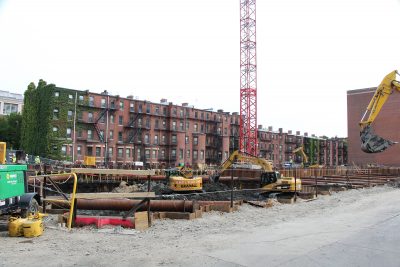
Boston University officials and construction leaders updated community members about progress on the Center for Computing and Data Sciences construction project in a Residence Life webinar Tuesday.
Students received updates about “that big hole” — as Dean of Students Kenneth Elmore called it — they can’t miss on Commonwealth Avenue when passing through Central Campus.
Experts from the Center for Computing and Data Sciences project updated community members about construction progress on the site adjacent to the College of Arts and Sciences and discussed the building’s sustainability during the Residence Life webinar.
Walt Meissner, associate vice president for Operations, said during the meeting building up the computer science department at BU is advantageous because virtually every research field relies on data sciences.
“[Data sciences] is the hammer that drives an effective research program,” Meissner said. “It’s certainly going to enhance our capabilities to interconnect with research and bring together our leaders.”
Meissner said the design of the building is “transformative” and unlike any other University building, in part because of its commitment to sustainability.
“Its sustainability … will put us as a leader in Boston and and a leader in New England,” Meissner said, “and set an example for building development for the country and the world.”
BU’s Climate Action Plan states the University aims to be carbon-neutral by 2040. Dennis Carlberg, associate vice president of University Sustainability, said the building is “a very bold step” that will help the University meet its goal.
The building will be carbon-free, Carlberg added, through the use of renewable energy — BU Wind — as opposed to gas. No gas lines will be connected to the building.
Carlberg said the University is seeking a Leadership in Energy and Environmental Design certification for the building, but until the project is completed, it won’t be clear whether this will happen.
The building will also include seven outdoor terrace spaces to reduce the urban heat island effect and increase rainwater retention, he added.
The BU community will likely not see these green spaces until later in the project, according to Chris Kenney, senior project manager for the Center for Computing and Data Sciences.
Jonathan Dolan, senior project manager at Suffolk Construction, said the project is beginning to “slowly start to work [its] way out of the ground.”
The noisiest excavation procedures are scheduled to wrap up next week, Kenney said. This stage in the process is followed by the concrete foundations and core constructions that will conclude in March 2021.
Those interested in project updates can subscribe to weekly project news and alerts via the Center for Computing and Data Sciences website.
One community member raised concerns regarding a group of workers spotted maskless.
Dolan said Suffolk Construction team members are taking COVID-19 seriously. He said all workers on site are asked to comply with BU guidelines and receive temperature checks daily.
“[University] policy is being enforced with a strict violation policy on our end,” Dolan said. “So one strike, two strike, three strike, and there’s obviously repercussions for breaches.”
Tom Larco, senior project manager at Suffolk Construction, said the company is doing all it can to enforce compliance.
“These workers are not used to wearing these masks,” Larco said. “We’re just trying to manage it as best we can. Non-compliance is not acceptable.”
ResLife Director David Zamojski answered concerns from another community member about the noise of the project affecting Bay State Road residents.
While nothing can be done about the noise during regular project hours of 7 a.m. to 6 p.m., Zamojski said ResLife addressed the one noise complaint he is aware it received.
Zamojski also said Bay State residents are notified about construction scheduling changes.
Construction is scheduled to end in its entirety on Oct. 28, 2022.
















































































































